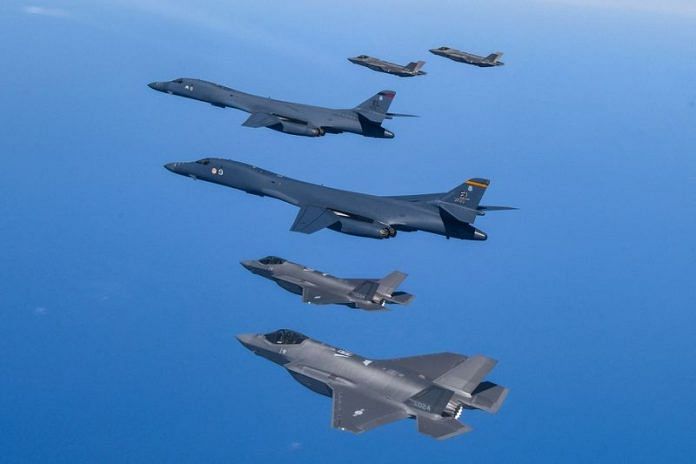By Hyunsu Yim
SEOUL (Reuters) -The United States separately deployed B-1B bombers for joint drills with South Korea and Japan on Wednesday, as the three allies have stepped up responses to threats from North Korea.
A U.S. B-1B flew alongside South Korean FA-50 jets and U.S. Air Force F-16 fighters as part of ongoing Ulchi Freedom Shield exercises, South Korea’s defence ministry said. It marked the 10th such flight by an American bomber this year.
North Korea routinely denounces the annual military drills as a rehearsal for war. The allies have stressed that the exercises are defensive.
Separately, two U.S. Air Force B-1Bs joined joint drills with 12 Japanese fighters, including four F-15 jets, according to Japan’s defence ministry.
The U.S.-led bomber drills came days after North Korea attempted a satellite launch that ended in failure.
The U.S. and South Korea began Ulchi Freedom Shield last week – a joint large-scale military exercise designed to enhance their response to Pyongyang’s nuclear and missile threats, with the second part kicking off on Monday.
Wednesday’s exercise was a demonstration of what the allies have called “extended deterrence” in the face of North Korea’s recent space launch vehicle flights and a show of “strong united defence posture”, South Korea’s defence ministry said in a statement.
Tokyo’s defence ministry said the U.S.-Japan joint air drills over the Sea of Japan on Wednesday confirmed the two militaries’ “readiness to respond to any situation” amid North Korea’s ballistic missile launches.
Japan also participated in a trilateral naval missile defence exercise with the U.S. and South Korea on Tuesday.
On Tuesday in a speech marking Navy Day, North Korean leader Kim Jong Un accused the United States and its allies of increasing the risk of nuclear war, referring to an Aug. 18 summit at Camp David between the United States, South Korea and Japan.
“Owing to the reckless confrontational moves of the U.S. and other hostile forces, the waters off the Korean Peninsula have been reduced to the world’s biggest war hardware concentration spot, the most unstable waters with the danger of a nuclear war,” Kim was quoted as saying by state media KCNA.
(Reporting by Hyunsu Yim in Seoul; Additional reporting by Kantaro Komiya in Tokyo; Editing by Gerry Doyle)
Disclaimer: This report is auto generated from the Reuters news service. ThePrint holds no responsibilty for its content.



